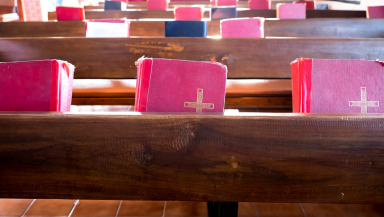
This year marks the 1700th anniversary of the Council of Nicaea and the formulation of the Nicene Creed. If you're not deeply familiar with Christian history or theology, that might sound like an obscure detail. You might even be wondering: what does a fourth-century church meeting have to do with me today?
Actually, quite a lot.
Let’s take a quick journey down history lane.
The Council that changed everything
The First Council of Nicaea took place in 325 AD, called together by Roman Emperor Constantine the Great in the city of Nicaea (modern-day İznik, Turkey). His aim? To bring unity to a fragmented empire.
While Constantine sought political stability, the bishops who gathered were focused on something deeper: the unity and clarity of Christian belief. At the heart of their discussions was a growing controversy known as Arianism - a teaching that denied the full divinity of Jesus Christ.
The result? The Council of Nicaea produced the Nicene Creed, set a lasting precedent for ecumenical councils (global gatherings of Christian leaders to define core beliefs), and even established a unified date for celebrating Easter.
Now that we've got the basics of what the Council of Nicaea was all about, you might still be asking: why does the Nicene Creed matter so much today?
The birth of the Nicene Creed
Well, as previously mentioned, one of the most enduring outcomes of this council was the creation of the Nicene Creed.
In today’s churches, you’ll hear a wide range of messages - some deeply rooted in Scripture, others perhaps less so. But the Nicene Creed brings us back to the centre. It grounds our congregations in the truth of Christ Himself, cutting through the noise and reminding us of what matters most.
The creed didn’t just resolve one theological debate; it set the foundation for what most Christians - Catholic, Orthodox, and Protestant - believe about God today.
It condemned Arianism, asserting the belief in one God – the Father Almighty, Jesus Christ as true God, begotten, not made, and of one substance with the Father (and that He was incarnated, crucified, resurrected and ascended) and the Holy Spirit as Lord and giver of life.
It also declared the belief in a united church, set apart for God’s purposes, open to all and present worldwide and built on the foundations of the apostles' teachings.
It acknowledged one baptism for the forgiveness of sins and pointed to the resurrection of the dead and the life of the world to come.
The Creed is still said every week in Catholic, Orthodox, Anglican, and many Protestant churches around the world.
Why this still matters
Let’s be real, Christian churches today can feel divided. Different doctrines, different styles of worship, even disagreements over what’s essential to the faith. Sometimes, that lack of unity is exhausting and confusing - not just for believers, but for seekers and sceptics watching from the outside.
That’s exactly why this anniversary is so powerful! It centres us. It reminds us of our shared foundation. It points us back to Christ and affirms our belief in the God who came down, died, rose, and is still alive and active today.
Even if you've never studied the Council of Nicaea, if you've ever said the words of the Nicene Creed, then you’ve participated in a tradition that stretches back 1,700 years. It has shaped how you think about God’s love, salvation, and your purpose in the world even if you didn’t realise it.
So, what now?
If your church is marking this milestone year, consider joining in. If it isn’t, maybe take the time to read the Nicene Creed again for yourself. Reflect on the shared faith in a loving triune God that unites billions of Christians across the world and across centuries.
This anniversary is more than just a historical footnote. It’s an opportunity to reconnect with what we believe and why it matters.













